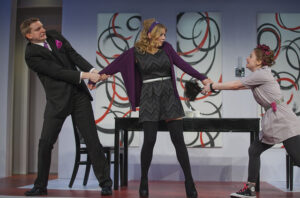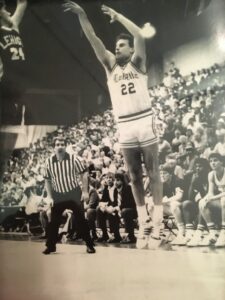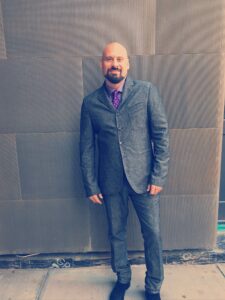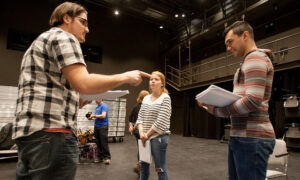Taking Advantage of Defining Moments
Paul Staubi ’88 didn’t shy away from the moment on an early January night in 1988. At the free throw line and up against national powerhouse Notre Dame—which had made it to the Sweet 16 of the NCAA Men’s Basketball Tournament the year before—Staubi coolly went 4-for-4 down the stretch to ice what remains the biggest regular-season win in Lafayette men’s basketball history.
For Staubi, a 6-foot-1 guard who was known for his long-range shot, the magnitude of the moment was put on hold by his focus.
“As an athlete, I thought I would make every shot I’ve ever taken,” says Staubi, who resides in New York City. “I hit four free throws; that was my job and that’s what I needed to do. I blocked out everything and just reverted back to all of my practice. In that moment, there was no fear … there was no excitement.”
The excitement came next and has lasted to this day and will far into the future. The echoes of a raucous, sold-out Kirby Fieldhouse still reverberate across the decades.
“You don’t really understand the moment until it passes and people continue to relive it and talk about it,” explains Staubi, an economics and business graduate. “In the 1980s, Notre Dame was the basketball program. But, we had a special team that year. We all got along. We all put our egos aside. We all wanted one thing, which was to win.”
Staubi says Notre Dame came in “extremely overconfident” and during a pregame practice, legendary coach Digger Phelps came into Kirby Fieldhouse with his team, looked around, and declared derisively, “This is a high school gym.”
After the improbable 83-68 win, the Leopard players pounded on a shared wall between the teams’ locker rooms and chanted, “High school gym! High school gym!”
“We knew that we did something special,” Staubi recalls. “We matched up well with them and we played together. We didn’t just beat them, we beat them. It wasn’t just a lucky win. That was our night and it had great impact on the program, it had great impact on the community, and it had great impact on everyone who was on the floor that night. For our entire lives, we can go back and remember that special night.”
Staubi strongly believes in defining moments—ones that can take place on a basketball court or others that occur with waves crashing nearby and sand underfoot.
“We all get a bunch of defining moments in our lives, and those who take advantage of them in the right way will benefit,” he says.
“Another defining moment for me happened when was I was on a vacation on a beach in South Carolina, and an idea popped in my head about creating a debit card that would fit in the health insurance industry. That day, I made a decision on the beach to take a risk, change the whole course of my company, and create a product called the Difference Card.”
Staubi was already in the health insurance world building self-funded health plans, so he understood the mechanics of a health insurance program. His vision was to combine the Difference Card with his own wellness program.
“This allowed employers to reduce their health insurance costs by about 15 percent,” he explains. “On the other side, employees didn’t have to change their doctors and their co-pays would remain the same as long as they participated in our wellness program, which we hoped down the road would make people healthier.”
The program took Staubi about nine months to develop, and he opened offices in New York, San Francisco, and Chicago before selling the company about three years ago. The Difference Card is now poised to go national.
“Lafayette was such a great springboard for my career in business,” Staubi says. “I learned a tremendous amount on the basketball court and in the classroom. There were lessons that were easy to learn and some lessons that were tougher, but they all translate to my career. For example, you don’t always get what you deserve in business, but those who continue to move forward regardless of the situation tend to succeed.”
Staubi has been willing to share his success by supporting the Lafayette men’s basketball and theater programs financially. Last spring, he funded a campus residency with theater professionals that involved student performances in an Off Broadway play and auditions at the Kennedy Center.
View photos and learn about students’ experiences with the Flux Theater Ensemble.
Pulitzer-Prize winning playwright Marsha Norman, who wrote the lyrics for the Broadway musical The Secret Garden, was the inaugural speaker in the Karyn and Paul ’88 Staubi Theater Lecture Series. Her visit to campus coincided with College’s production of the play performed at the Weiss Black Box Theater in Buck Hall.

Students perform in Tartuffe. A gift from Paul Staubi ’88 helped fund a residency of New York theater professions, who worked with students on the play.
Although Staubi didn’t have a connection to theater as a student, he has developed a profound passion for the arts through his daughter, Lexi, a singer and actress who appeared in a Super Bowl commercial several years ago.
“As a father, all of a sudden I became exposed to the arts and I fell in love with them,” says Staubi, who has four children. “Lexi opened my eyes, and I’ve seen the impact that the arts can make not only on her, but on all who participate in them. Kids become so much more confident when they perform and participate in the arts. I plan to be a supporter of them for the rest of my life.”
A major figure in Lafayette’s arts program, Suzanne Westfall, was a catalyst for Staubi’s success at Lafayette. During his first semester, he took an English course and submitted a paper on which he had worked very hard. During a meeting to review it, Staubi’s professor questioned how he got into Lafayette.
The experience shook him. The next semester, he took an English class with Westfall, who’s also a member of the theater faculty and former director of the arts. After submitting his first paper, he met with her to review it.
“She looked me in the eye and told me I was one of the smartest people here,” Staubi recalls. “Professor Westfall helped to change my mindset. I was this fragile student wondering if I could survive here. The impact not only of her comment, but of the relationship that we had helped me to gain the confidence to not only achieve on the basketball court, but to achieve off the court. She supported me, encouraged me, and challenged me to be better. For me, it was a double bonus that Professor Westfall was involved in the theater department.”
Staubi’s support aligns with his philosophy to remember the past, enjoy the moment, and try to make the future even better.
“My past with Lafayette is full of such great memories,” he says. “Lafayette truly is a special place. It is the foundation for a lot of the success I’ve had in my life. For me to help in a small way with the future of Lafayette is really fulfilling.”



1 Comment
Comments are closed.